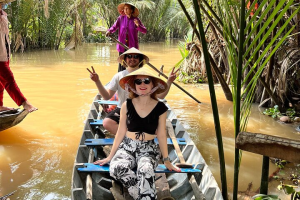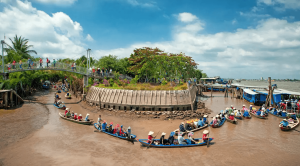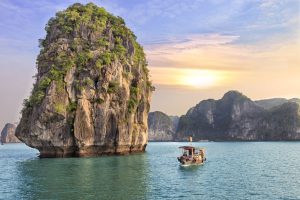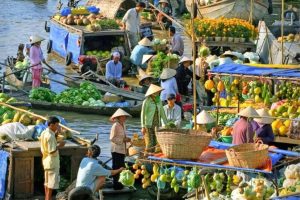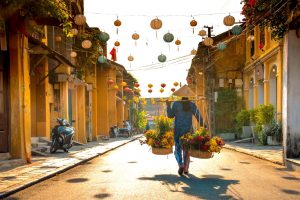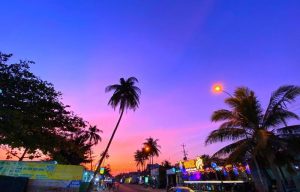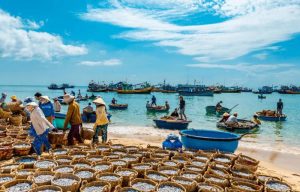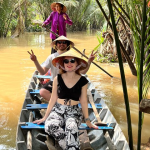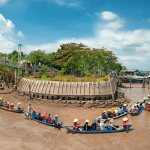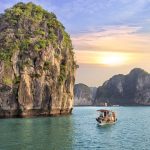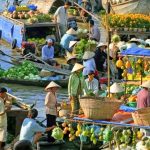The Mekong Delta is a lush, water-soaked region where rivers and canals shape daily life. Among its most captivating features are the Mekong Delta markets, bustling hubs of trade, culture, and community that draw travelers from around the globe. From iconic floating markets to vibrant land-based bazaars, these markets offer a window into the soul of southern Vietnam. In this guide, we’ll dive into the top markets, their unique characteristics, cultural significance, and practical to ensure an unforgettable visit for you!
Top 5 iconic Mekong Delta markets you shouldn’t miss
The Mekong Delta is home to some of the most iconic markets , each bursting with its own unique charm and local specialties. Here are the top 5 must-visit markets in the Mekong Delta that will captivate your senses and leave you craving more:
Cai Rang Floating Market (Can Tho)
As the largest and most famous floating market in the Mekong Delta, Cai Rang is a lively and colorful scene where boats brim with tropical fruits, fresh vegetables, and local treats. Just 6 km from Can Tho city, hundreds of boats converge early in the morning, painting the river with a lively and colorful mosaic. From juicy mangoes to steaming bowls of hu tieu (noodle soup), Cai Rang offers an unforgettable feast for all your senses.
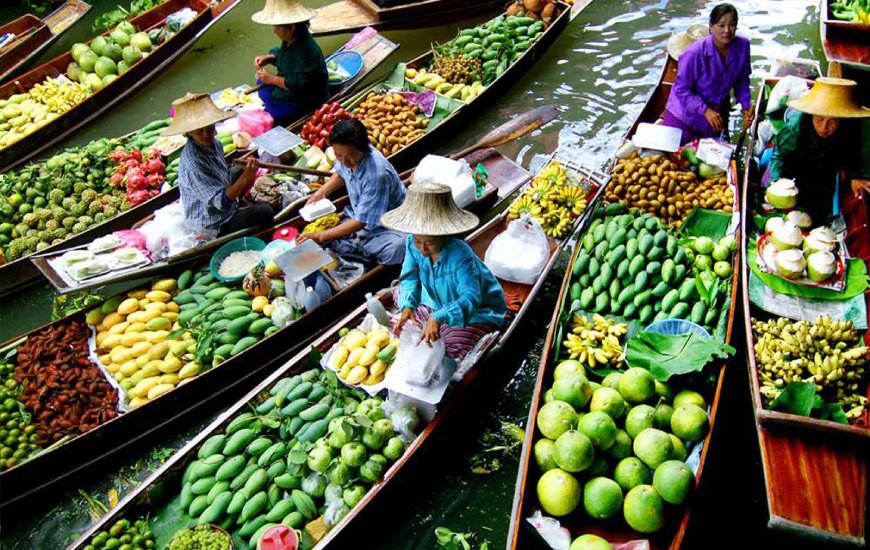
Cai Be Floating Market (Tien Giang)
Just a two-hour drive from Ho Chi Minh City, Cai Be is a quieter alternative to Cai Rang. Known for its wholesale trade of fruits like rambutans and starfruits, this market has been a vibrant trading hub since the 18th century. Though smaller due to modern land-based markets, Cai Be still delivers an authentic taste of rural life. The best way to soak it all in? Glide through its tranquil canals on a sampan and arrive by 6 AM to catch the market at its liveliest.
Chau Doc Market (An Giang)
Located near the Cambodian border, Chau Doc Market is a vibrant cultural crossroads where Vietnamese, Khmer, and Cham communities come together. It’s packed with fresh produce, colorful spices, and local specialties. The market’s standout is mam – fermented fish products that are a cornerstone of southern Vietnamese cuisine.
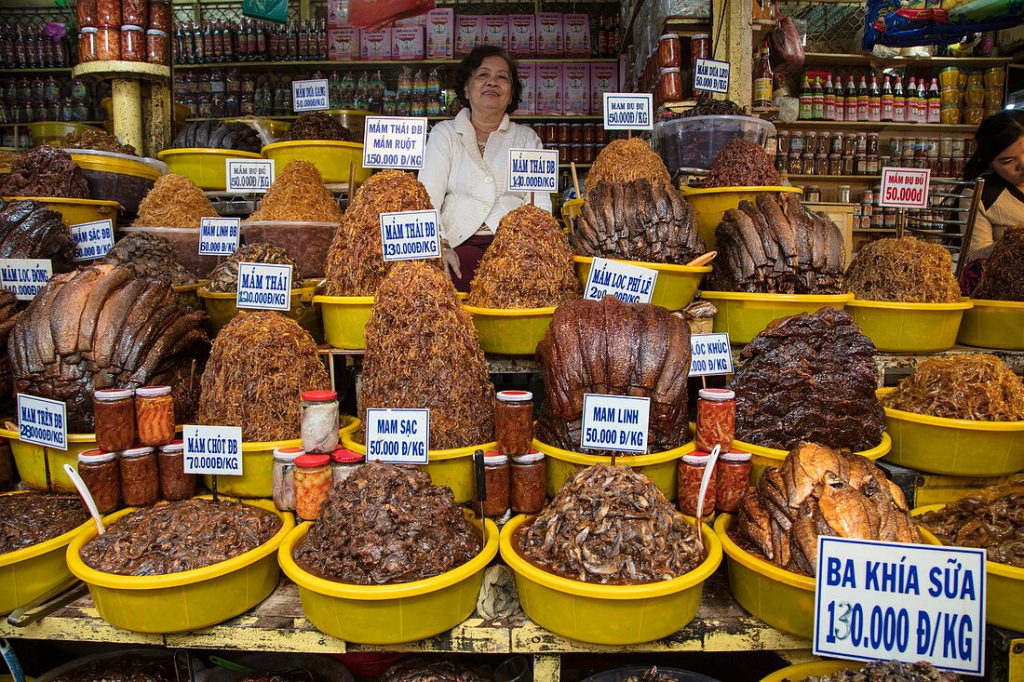
Tinh Bien Insect Market (An Giang)
If you’re an avid adventurer craving something truly off the beaten path, head to the Tinh Bien Insect Market in An Giang province. This one-of-a-kind land market specializes in edible insects like scorpions, centipedes, and tarantulas that are local delicacies that highlight the Mekong Delta’s daring culinary spirit. It’s a bold and fascinating cultural experience that’s sure to leave a lasting impression.
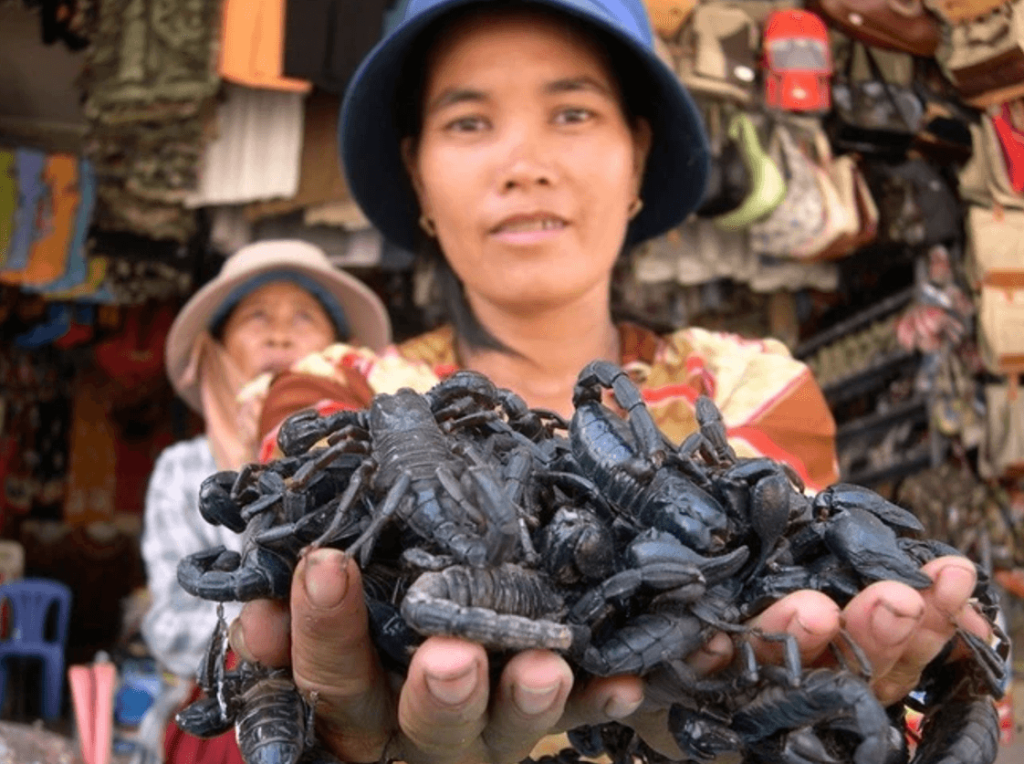
Nga Bay (Phung Hiep) Floating Market (Hau Giang)
Nga Bay (Phung Hiep) Floating Market in Hau Giang is one of the oldest and most historic markets in the Mekong Delta. It’s uniquely located at the meeting point of seven rivers, creating a dynamic and scenic trading hub. From fresh produce to handmade goods, the market offers a colorful glimpse into the region’s rich cultural heritage.
2 Types markets in the Mekong Delta
The Mekong Delta markets come in two primary forms: floating markets and land-based markets. Each type has its own distinct vibe and role in the region’s economy and culture.
Floating market – The signature of Mekong Delta markets
Floating markets are the beating heart of the Mekong Delta, shaped by a maze of rivers and canals that define daily life in this region. Dating back over a century, these markets began when boats were the only way to trade, long before roads reached the area. Today, they remain a vibrant tradition, with vendors selling everything from tropical fruits and vegetables to hot meals and household items – all from their boats. A unique feature is the cây bẹo, where sellers hang samples of their goods on long poles so buyers can spot what’s available from a distance.
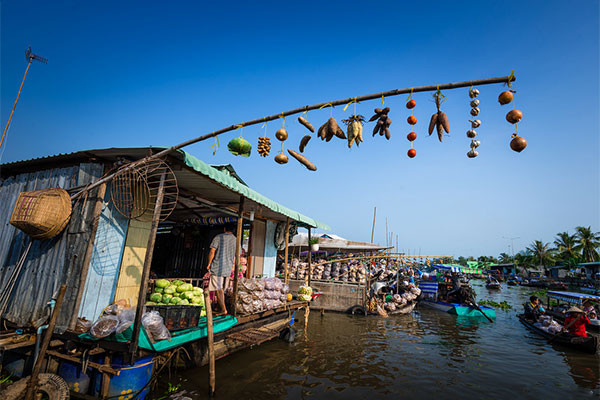
Drifting on the boat, you can hear the air humming with the rhythmic calls of vendors, their voices rising in melodic chants or even impromptu songs to draw in buyers. The lively chatter and laughter blend with the splash of oars and the gentle lapping of waves against wooden boats, creating a bustling, almost musical atmosphere. You can even smell the scent of ripe mangoes, grilled pork, and fragrant herbs wafting through the morning mist. Just take some pictures of vibrant boats overflowing with goods in a dazzling mix of greens, oranges, and fiery reds, painted in bold reds, blues, and yellows.
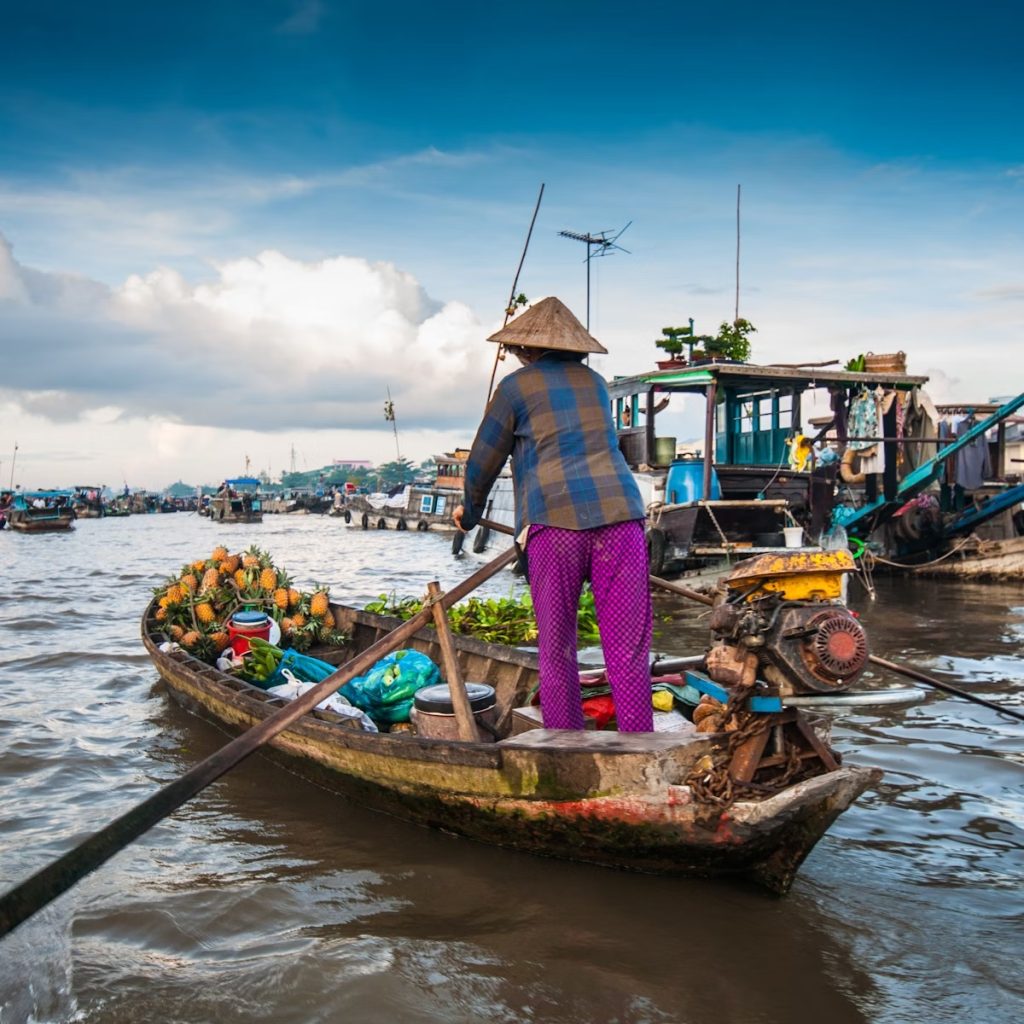
Though modern infrastructure has developed over the years, floating markets still flourish along the Mekong’s winding rivers. They preserve a way of life that’s deeply tied to the water and rich in cultural heritage. For visitors, it’s like stepping into a lively, floating world: genuine, unforgettable, and purely Vietnamese.
Read more: Can Tho in Vietnam: Unveiling the Heart of the Mekong Delta
Traditional ground market
Land-based markets in the Mekong Delta are every bit as lively as their floating counterparts, offering a rich, down-to-earth experience for both locals and curious travelers. Found in bustling town centers, these markets boast everything from farm-fresh produce and handmade crafts.
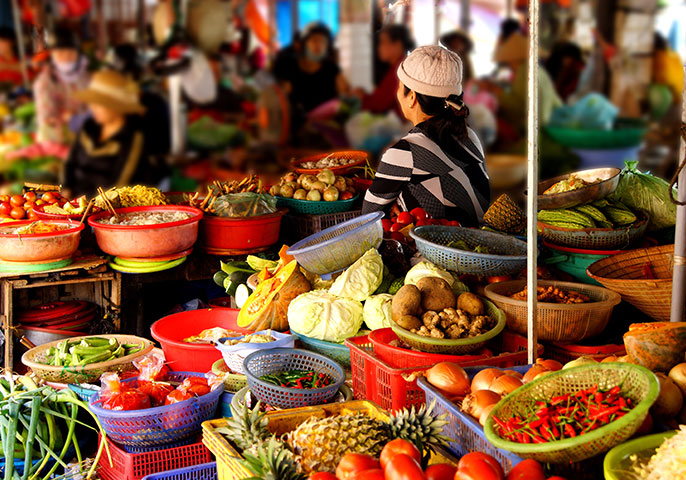
Unlike floating markets, these operate all day and aren’t tied to river conditions, making them more accessible year-round. They’re perfect for travelers who enjoy exploring on foot and soaking in the rhythms of everyday life. On the other hand, night markets come to life after dark as lanterns flicker, street food sizzles, and lively crowds create an atmosphere that’s as magical as it is memorable.
Both types of Mekong Delta markets in the Mekong Delta beautifully complement each other, offering a well-rounded glimpse into the region’s rich commerce and cultural heritage. Whether you’re drifting past boats or weaving through bustling alleyways by foot, each experience reveals the Delta’s vibrant, soul-stirring charm.
The cultural significance of Mekong Delta markets
The Mekong Delta markets are more than just places to buy and sell but cultural cornerstones that define the region’s identity. For centuries, these markets have been social and economic hubs where communities connect, share stories, and sustain traditions. Floating markets, in particular, reflect the Delta’s unique adaptation to its watery landscape, showcasing the ingenuity of locals who turned rivers into bustling marketplaces.
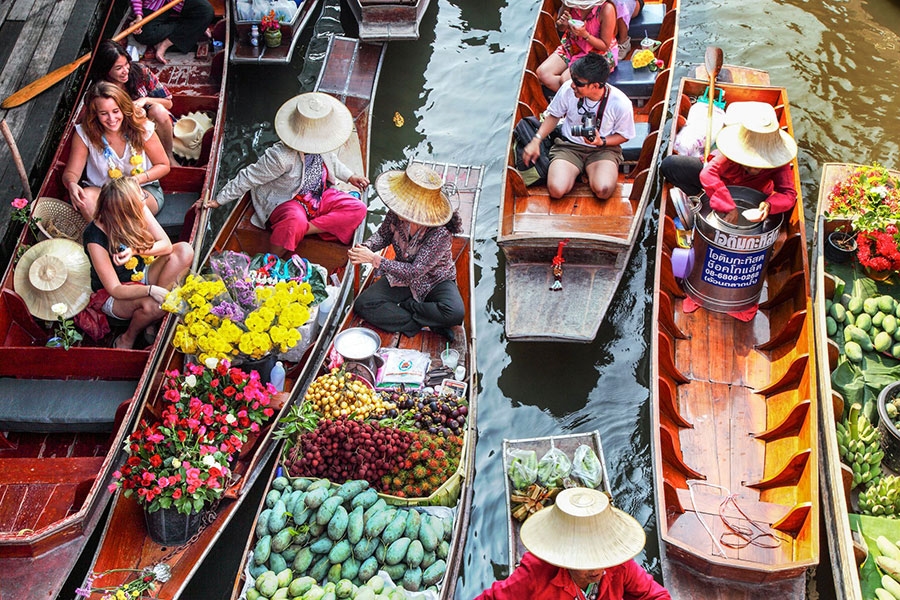
These markets are also a celebration of the Delta’s agricultural abundance. As Vietnam’s “rice bowl,” the region produces over half of the country’s rice, along with a dazzling array of tropical fruits and fish. Markets like Cai Be are vital links in the supply chain, distributing goods across Vietnam and beyond. Other than that, they’re spaces where cultural practices, like the cây bẹo tradition or vendors’ melodic sales songs are preserved, turning each market into a living museum of southern Vietnamese heritage.
For locals, markets are a way of life that fosters community bonds and economic resilience. During the floating season from August to November, when floods reshape the landscape, vendors adapt by showcasing the season’s bounty of fish and water vegetables. For tourists, these markets offer an authentic glimpse into the Delta’s soul, blending commerce, culture, and hospitality in a way that’s uniquely Vietnamese.
What to do và what to eat in Mekong Delta markets
Exploring the Mekong Delta markets is an adventure in itself, but there’s more to do beyond shopping. Here are some key recommendations for what to do and what to eat in Mekong delta markets that will enrich your travel itinerary.
Best activities in Mekong Delta markets
Kick off with a boat tour at dawn to catch the floating markets in full swing, by sampans or small boats, are perfect for drifting through the lively scenes of Cai Rang or Cai Be. Wander through lively stalls overflowing with juicy tropical fruits, fragrant spices, and beautiful handmade crafts.
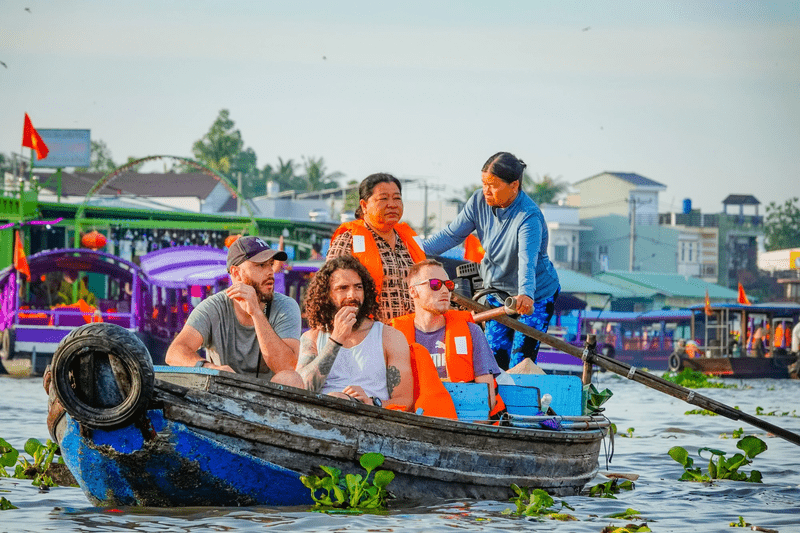
Don’t forget to savor mouthwatering street food like crispy bánh xèo while chatting with warm, welcoming vendors. Together with these, catch the magical buzz of early mornings when colorful boats float in with fresh goods. It’s a thrilling mix of culture, flavors, and unforgettable local vibes you won’t want to miss!
Read more: What to do in Mekong Delta: Top 20 activities you can’t miss
Best foods you can’t ignore
The Mekong Delta markets are a true paradise for food lovers, packed with fresh, local flavors that excite every palate. At floating markets, grab breakfast on a boat, such as bún riêu (crab noodle soup), or bún mắm (fermented fish noodle soup) for a bold taste of the Delta. Don’t miss the tropical fruits like mangoes, rambutans, and dragon fruits, picked fresh and bursting with natural sweetness.
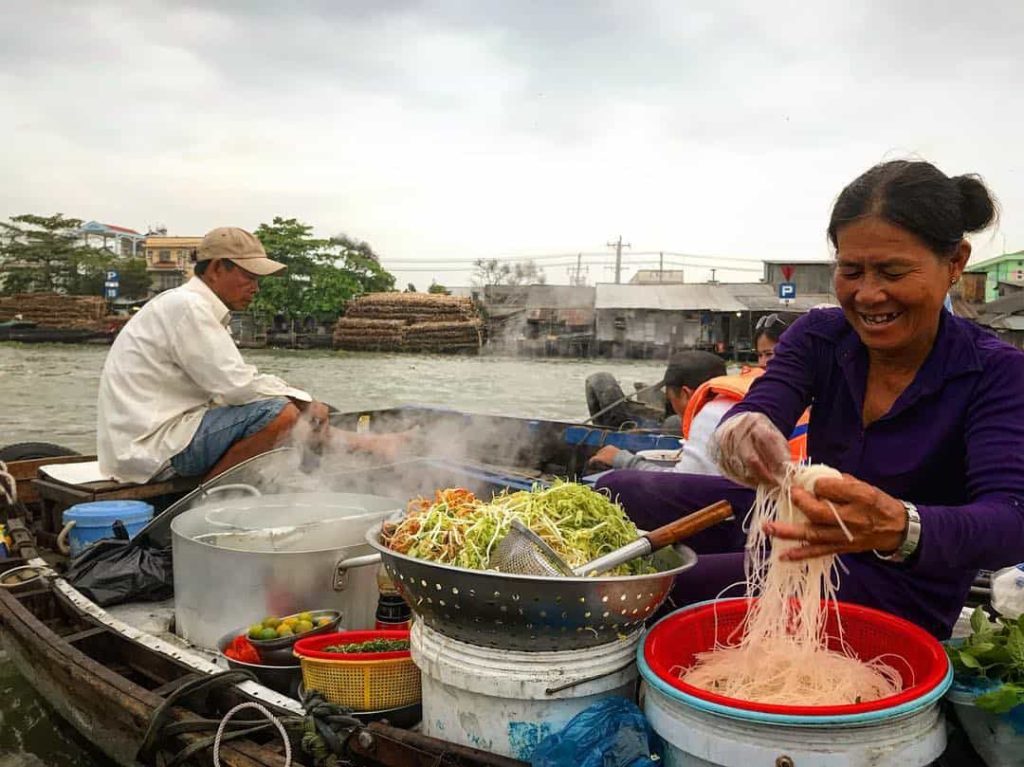
At land-based markets like Tinh Bien, adventurous eaters can try grilled insects or rat meat, a local delicacy paired with cold beer. If you have a sweet tooth, pick up coconut candy or sticky rice cakes from vendors. And to top it all off, sip on a strong cup of Vietnamese coffee, served right from floating boats
Essential for exploring Mekong Delta markets
To make the most of your visit to the Mekong Delta markets, consider these practical :
- Visit early: Floating markets are busiest from 5 AM to 8 AM, so plan to arrive at sunrise for the full experience. Land-based markets are more flexible but still peak in the morning.
- Choose the right season: The dry season (December to April) offers clear skies and calm waters, ideal for boat tours. The rainy season (May to November) can bring short showers or flooding, especially in remote areas like Dong Thap. So, be sure to check the weather forecast before you go.
- Negotiate boat rides: Boat tour prices can vary widely, so it’s smart to compare offers from different operators at popular docks like Ninh Kieu Wharf to ensure you get the best deal.
- Stay safe: Life jackets are recommended for all boat trips, especially in busy waterways. Always keep a close eye on your belongings when navigating crowded markets.
Visiting Mekong Delta markets is surely a must for any traveler looking to experience the heart of Southern Vietnam. For a hassle-free adventure filled with the region’s most iconic activities, tours like the Mekong Delta 1 Day or 2 Days 1 Night and MeKong Delta 1 day are perfect choices for you. Backed by 20 years of experience in organizing tours across Vietnam, Laos, and Cambodia, and trusted by thousands of satisfied travelers, we’re committed to delivering truly unforgettable experiences. You’ll embark on a once-in-a-lifetime journey just by calling +84931152368


